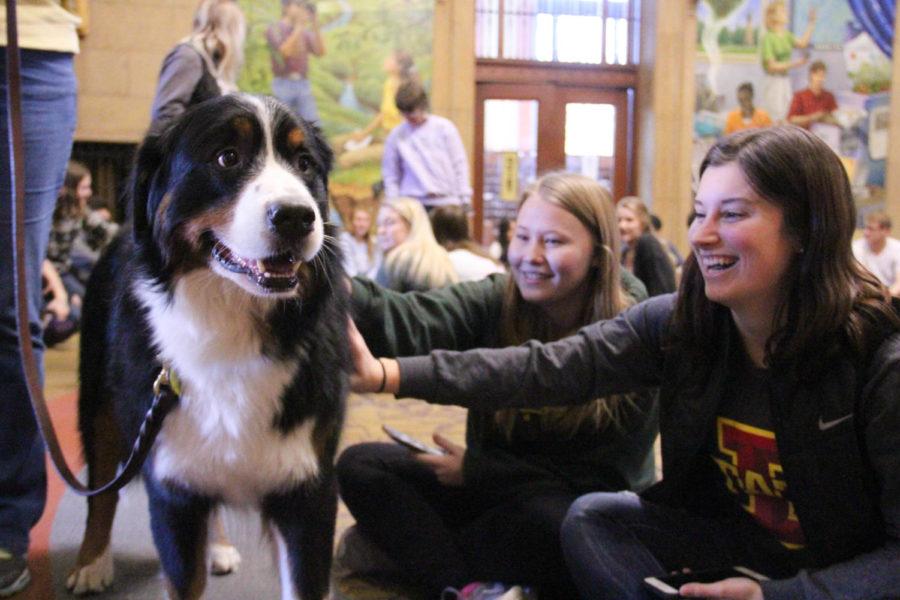Petzold: Pets without stigma
Iowa State students playing with dogs at Parks Library during the annual dead week tradition Barks at Parks on Dec. 6.
March 5, 2018
I don’t know about anyone else, but I have had a cat in the house for the majority of my life. I think there were only two years I was without a cat. Well, three now.
It took a great toll on me to leave my cat behind when I moved away to college, and it has made the transition even harder. Not only did I leave the protection of my parents, I left my friends, my brother and my furry friend. That is a lot of loss in a short amount of time.
I have talked to many students on campus who had to leave their pet at home. Typically they agree with me that leaving your pet behind has made starting college harder than it should have been.
The only way of getting a furry creature while being a freshman or while living near campus is to get an emotional support animal. This form not only requires a doctor’s signature, but holds a bad stigma that may follow you past college.
Needing an animal in college does not make you mentally unstable. It makes you the same as anyone else. Needing an animal only changes your life at home, not your life around others. There shouldn’t be such a bad stigma that goes with the need of an animal.
One article from Pet Partners gives examples of how animals have helped people with studies on people who are ill. One study from the article states, “Fibromyalgia patients spending time with a therapy dog instead of in an outpatient waiting area at a pain management facility showed significant improvements in pain, mood and other measures of distress.”
Another states, “The presence of an animal can significantly increase positive social behaviors among children with autism spectrum disorder.” These two studies have one thing in common — they both have shown improvements with mood and sociability in people.
I am not suggesting that just because the typical college student is healthy doesn’t mean they don’t need an animal in their life. I am suggesting all humans could benefit from the perks of having an animal.
College is obviously stressful and seems to test students in many ways during their time attending college. With more stress than high school and few healthy ways to relieve it, it is absurd why it takes a permit to have an animal in most places on or near campus.
The same article from Pet Partners states, “Pet ownership, perhaps by providing social support, lowers blood pressure response to mental stress” and “recognizing and nurturing the connection between animals and humans has potential implications for individual stability and health, improved economic outputs and healthcare cost savings.”
The major benefits found from having an animal are reduced blood pressure, lower death rates after a heart attack, and decreased loneliness and depression. Also, having a pet can reduce separation anxiety for new college students. While some of these don’t apply to the typical college student, everyone is susceptible to loneliness and depression.
The Odyssey Online brings its reader’s attention to the time and dedication it takes to care for any animal and that is a major concern for all animal owners and their parents. But for those of us who have grown up with animals and know how to take care of the animal, it will not be hard to fit that into the admittedly busy schedule college offers.
The best advice I could give on this note is to either adopt the animal while it is young during the summer when you can be fully devoted to it or buy an animal who’s older and has a good track record. This will prevent the young, needy stage of the animal clashing with the busy college student.
It is understandable why the college has been so strict on the pet policy in dorms and on-campus housing. There should be a building set aside for students with animals, available to freshman, and without the stigma one may get when applying for an emotional support animal. Students shouldn’t have to feel bad or possibly lose a job opportunity because they wanted a pet in a strict, no pet policy building.







